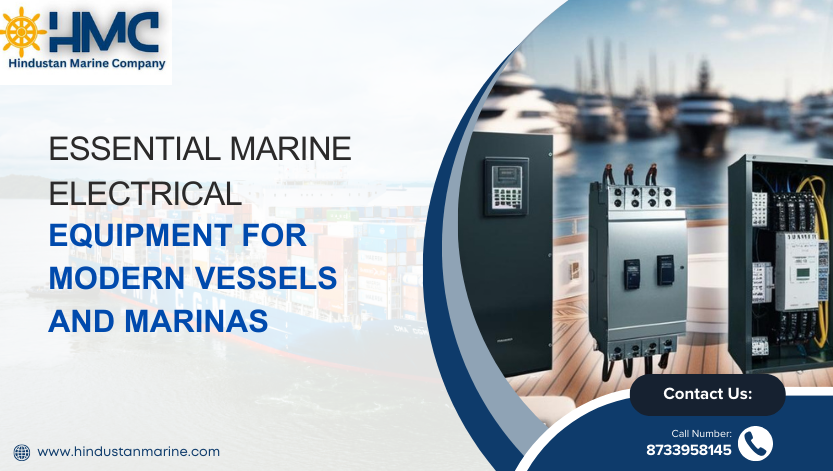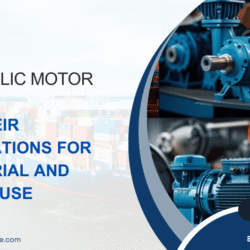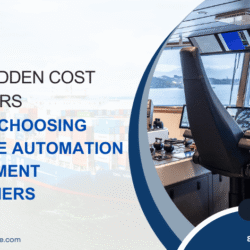
Essential Marine Electrical Equipment for Modern Vessels and Marinas
In today’s marine industry, electrical systems are the backbone of safe and efficient vessel operations. From navigation to automation, the need for advanced marine electrical equipment is growing rapidly. Whether you’re managing a commercial ship, fishing vessel, or modern marina, investing in reliable systems like an Engine Control System ensures optimal performance and safety.
According to the Global Marine Electronics Market Report 2024, the market is projected to reach USD 8.56 billion by 2027, indicating a rising demand for smarter, integrated electrical solutions onboard.
What is Marine Electrical Equipment?
Marine electrical equipment refers to the electronic and power-based systems used on ships and boats to support various functions like propulsion, lighting, navigation, safety, and communication. These systems must be rugged, waterproof, and designed to withstand harsh marine conditions.
Key Types of Marine Electrical Equipment
1. Power Distribution Systems
Used for safe and balanced energy distribution across a vessel’s components. These include:
- Main switchboards
- Circuit breakers
- Distribution panels
2. Engine Control System
Modern vessels rely heavily on automation. The Engine Control System ensures accurate engine monitoring, fuel efficiency, and safe operations through advanced sensors and controllers.
3. Marine Generators
Vital for backup and main power supply. Popular models include:
- Diesel marine generators
- Hybrid and solar-compatible units
4. Navigation Lights and Systems
Mandatory for safety and legal compliance, these include:
- Navigation lights (port, starboard, stern)
- Radar systems
- GPS and autopilot equipment
5. Battery Management Systems
Marine batteries power emergency tools, navigation, and communication systems. A Battery Management System (BMS) protects these assets from overcharging or deep discharge.
Benefits of High-Quality Marine Electrical Equipment
- Enhanced Safety: Protects against short circuits, overloads, and fire hazards.
- Operational Efficiency: Automation tools reduce manual intervention and downtime.
- Fuel Savings: Modern systems contribute to more energy-efficient voyages.
- Compliance: Meets international marine regulations like IMO and SOLAS.
Choosing the Right Marine Electrical Supplier
Here are some key points to evaluate:
- Certifications: Look for ISO, CE, or IEC-certified equipment.
- After-Sales Support: Ensure availability of local maintenance services and spares.
- Customization: Marine environments vary, so customized solutions are often essential.
- Integration: Choose suppliers offering full-stack automation solutions like control panels, sensors, and marine-grade wiring.
Latest Trends in Marine Electrical Equipment (2025)
- IoT Integration: Smart monitoring for engines, fuel, and bilge systems.
- Green Technology: Use of solar-powered panels and energy-saving LED lighting.
- Remote Diagnostics: Troubleshooting marine equipment through apps or cloud dashboards.
- Hybrid Power Systems: Combining diesel, solar, and battery storage.
For marine automation and control solutions beyond engines, explore Hindustan Marine’s marine automation product range.
Conclusion
Investing in reliable marine electrical equipment is not just about modernizing your vessel or marina—it’s about safety, efficiency, and long-term cost savings. With smart systems like Engine Control Systems and integrated marine automation, you’re building a future-ready maritime operation.
FAQs – People Also Ask
1. What is marine electrical equipment used for?
Marine electrical equipment is used for powering, navigating, communicating, and automating ship operations safely and efficiently.
2. Why is an Engine Control System important for vessels?
It automates engine functions, optimizes fuel use, and ensures real-time diagnostics, improving both performance and safety.
3. How do I choose the right marine electrical system?
Focus on certified equipment with waterproof designs, compatibility with existing systems, and strong after-sales support.
4. What are the common marine electrical problems?
These include corrosion, short circuits, voltage drops, and overheating due to poor maintenance or outdated systems.
5. What trends are shaping the future of marine electrical equipment?
IoT integration, hybrid power solutions, and cloud-based monitoring are transforming how vessels are managed.





 Fast Delivery
Fast Delivery Easy Returns
Easy Returns Instant Quote
Instant Quote Product Demo
Product Demo